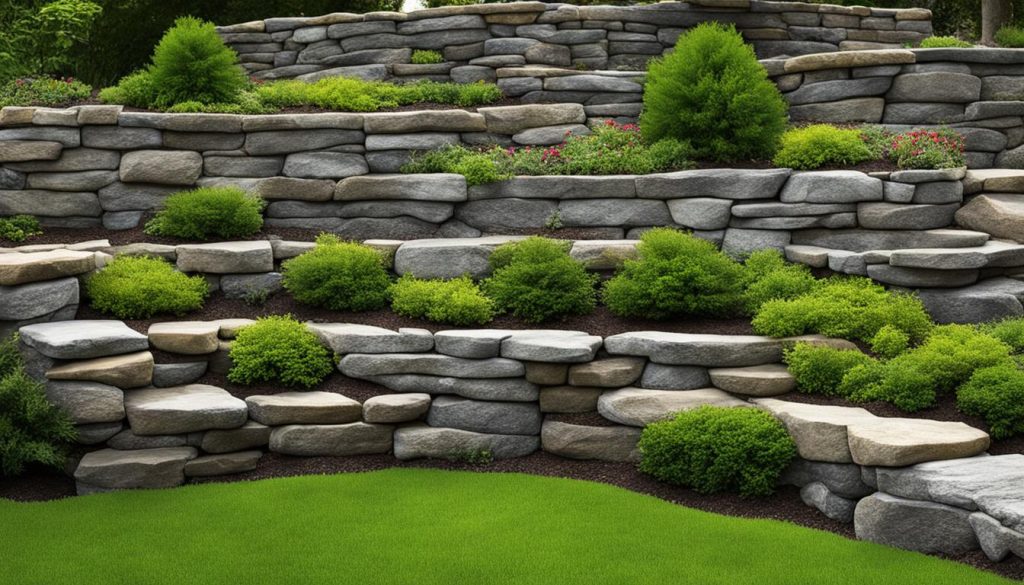Welcome to our guide on choosing the perfect material for your retaining wall. As experts in the field, we understand the importance of selecting a material that is both durable and attractive. A well-built retaining wall can enhance the beauty of your outdoor space while providing stability and protection against soil erosion.
Choosing the right material for your retaining wall can be a daunting task. With so many options available, it’s essential to consider several factors to ensure you make an informed decision. In this section, we’ll discuss the key factors to consider before selecting a material and explore the pros and cons of popular retaining wall materials such as concrete, natural stone, timber, brick, and gabion.
Key Takeaways:
- Choosing the right material is crucial for the durability and aesthetics of your retaining wall.
- Consider factors such as budget, location, soil type, and desired height before selecting a material.
- Popular retaining wall materials include concrete, natural stone, timber, brick, and gabion.
- Each material has its pros and cons, so it’s essential to weigh these factors before making a decision.
- Consulting with professionals can help ensure a well-built and long-lasting retaining wall.
Factors to Consider Before Choosing a Retaining Wall Material
When it comes to choosing the right material for your retaining wall, there are several factors to consider. We understand that it can be overwhelming to navigate different options, but with our guidance, you can make an informed decision that fits your needs and budget. Here are some essential factors to keep in mind before choosing a retaining wall material:
- Budget: The cost of materials can vary greatly, so it’s important to set a realistic budget for your project. Keep in mind that more expensive materials may be more durable and require less maintenance, ultimately saving you money in the long run.
- Location: Consider the location of your retaining wall, as certain materials may be more suitable than others. For example, if your wall will be near a water source, you’ll need a material that can withstand moisture and erosion.
- Soil Type: The type of soil you have can also impact your material selection. In areas with softer soil, you’ll need a material that offers superior strength and stability.
- Desired Height: The height of your retaining wall can also influence your material choice. Some materials may not be suitable for taller walls, as they may not be able to handle the weight and pressure.
Factors to Consider Before Choosing a Retaining Wall Material Example Table
| Factor to Consider | Explanation | Material Options |
|---|---|---|
| Budget | Money you want to spend on building the wall. | Concrete, Timber, Gabion |
| Location | Where will the wall be built, near water, indoor, outdoor. | Natural Stone, Concrete, Brick |
| Soil Type | What type of soil, clay soil, sandy soil. | Natural Stone, Concrete, Brick |
| Desired Height | How tall is the wall going to be? | Concrete, Brick |
Concrete: A Sturdy and Versatile Retaining Wall Material
When it comes to durability and strength, concrete is a top choice for retaining wall materials. Its robust nature allows it to withstand the pressure of soil and water, making it a reliable option for long-lasting retaining walls. Not only is concrete sturdy, but it’s also incredibly versatile, allowing you to choose from various designs and finishes to match your outdoor space’s aesthetic.
Benefits of Concrete Retaining Walls
There are numerous benefits to using concrete for your retaining wall project. Here are just a few:
- Strength and Durability: As previously mentioned, concrete is incredibly strong and can withstand significant pressure from soil and water.
- Wide Range of Finishes: With concrete, you can choose from a wide range of finishes, including textured, stamped, and stained, to match your outdoor space’s aesthetic.
- Low Maintenance: Once installed, concrete retaining walls require minimal maintenance and can last for several years without needing any significant repairs.
- Affordability: Compared to some other materials, concrete is a relatively affordable option for retaining walls, making it an accessible choice for many homeowners.
Installation and Maintenance
When it comes to installation, it’s essential to work with a professional contractor who has experience with concrete retaining walls. Proper installation is crucial for the structure’s longevity and effectiveness.
Once installed, concrete retaining walls require minimal maintenance. However, it’s still essential to regularly inspect your wall for any cracks or signs of damage and address them promptly to prevent any further issues.
Overall, concrete is an excellent choice for homeowners looking for a reliable and durable material for their retaining walls. Not only is it sturdy and robust, but it’s also customizable and affordable, making it an accessible option for many outdoor projects. Contact us at Retaining Wall Repair to learn more about our concrete retaining wall services and how we can help you create the outdoor space of your dreams.
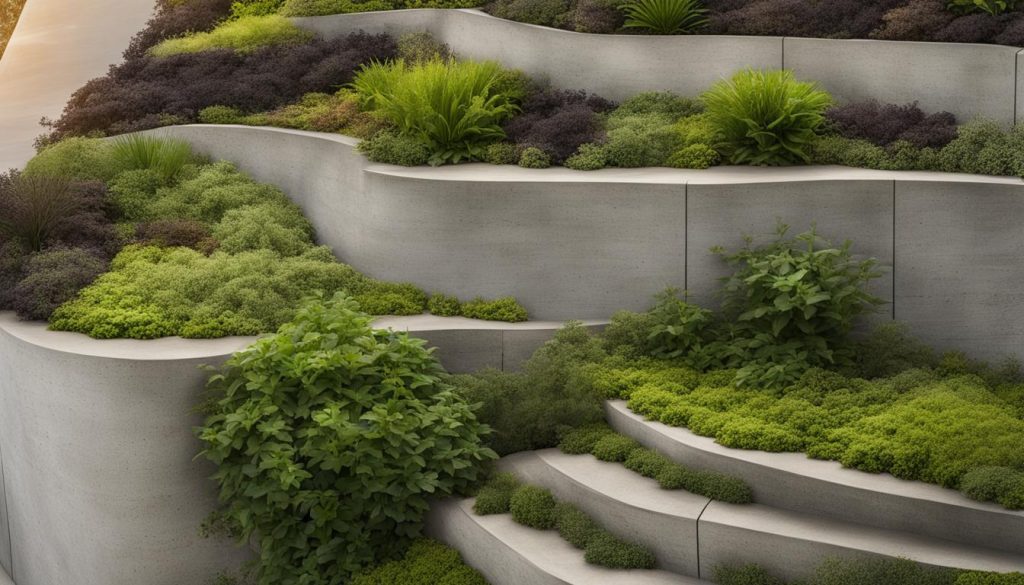
Natural Stone: Enhancing Beauty and Strength in Retaining Walls
In this section, we’ll explore the benefits of natural stone retaining walls and provide tips on selecting the right type for your project. Natural stone retaining walls provide a timeless and elegant look while offering exceptional strength, making them a popular choice for homeowners looking to enhance their outdoor space.
Types of Natural Stones for Retaining Walls
There are different types of natural stones to choose from for your retaining wall. Each type has its unique advantages and aesthetic qualities. Here are some of the most popular natural stones used for retaining walls:
| Natural Stone Type | Advantages |
|---|---|
| Granite | Durable, scratch-resistant, and non-porous |
| Limestone | Unique texture, easy to cut, and shapes well |
| Sandstone | Soft texture, comes in various colors, and easy to shape |
It’s essential to consider the stone’s properties and how they align with your project’s objectives. For instance, if you intend to build a retaining wall near a water feature, you may consider using non-porous stones such as granite to prevent water seepage.
Benefits of Using Natural Stone for Retaining Walls
Natural stone walls offer several advantages that make them an ideal choice for retaining walls, including:
- Strength: Natural stones are sturdy and can withstand heavy pressures, making them ideal for retaining walls of varying heights.
- Durability: Natural stone materials can last a lifetime, with little maintenance or repair needed.
- Visual Appeal: Natural stone walls offer a timeless aesthetic that complements any outdoor space, adding value to your property.
- Flexibility: Natural stone materials come in various sizes, shapes, and colors, making them versatile and customizable to suit your design preferences.
As you consider the benefits of natural stone walls, it’s equally essential to factor in the costs associated with sourcing and installing these materials. Natural stone materials tend to be more expensive than other retaining wall materials, such as timber. However, the value they bring to your property in terms of beauty, durability, and longevity makes them a worthwhile investment.
Timber: A Classic Choice for Retaining Walls
When it comes to creating a retaining wall, there are numerous options available in terms of materials. One classic choice that never goes out of style is timber. Its natural beauty and versatility offer a warm and inviting aesthetic that complements various outdoor settings. In this section, we’ll discuss the advantages of using timber walls, including their ease of construction and maintenance, along with some important considerations for choosing the right timber material.
Benefits of Timber Retaining Walls
Timber walls have been a popular choice for many years, and it’s not hard to see why. Some of the benefits of timber retaining walls include:
- Easy to construct: Unlike other materials that require special tools and equipment, timber walls can be easily built by anyone with basic carpentry skills.
- Cost-effective: Timber is a relatively affordable material, making it an ideal choice for those on a budget.
- Low maintenance: With proper installation and treatment, timber walls are resistant to decay, insects, and other potential issues, requiring little maintenance.
- Customizable: Timber walls can be easily modified to fit any landscape, making them a versatile choice for retaining walls.
Overall, timber retaining walls offer a beautiful and practical solution to your landscaping needs.
Choosing the Right Timber Material
When it comes to choosing the right timber material for your retaining wall, there are a few factors to consider:
- Wood type: Different types of wood have varying levels of durability and resistance to rot and insects. Some popular options include cedar, redwood, and pressure-treated wood.
- Width and thickness: The size of your wall and the amount of pressure it will endure will determine the necessary width and thickness of your timber.
- Treatment: It’s important to choose treated timber to prevent decay and insect infestation. ACQ-treated wood is a popular choice for its environmentally-friendly benefits.
By taking the time to consider these factors, you can ensure that you choose the right timber material for your retaining wall project.
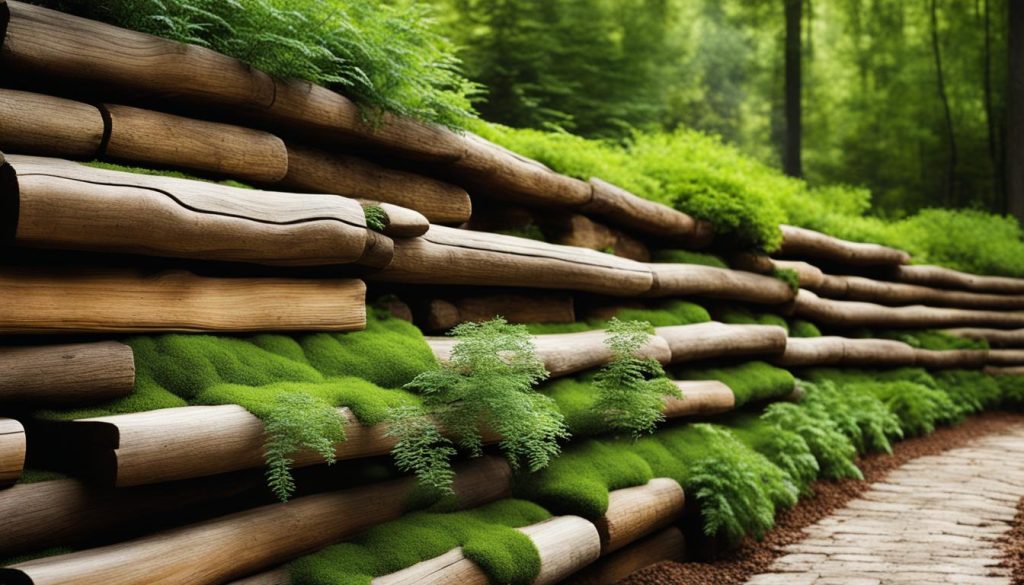
Overall, timber retaining walls are a classic choice that can provide a beautiful and practical solution to your landscaping needs. Their ease of construction, affordability, and low maintenance make them an attractive option for any homeowner. If you’re interested in exploring timber retaining walls further or need assistance with repair or installation, don’t hesitate to contact us at Retaining Wall Repair.
Brick: Traditional Charm and Durability
Bricks are a timeless and classic choice for retaining walls that can add traditional charm to any outdoor space. With their durability and strength, brick retaining walls are a popular option for both residential and commercial landscapes.
One of the advantages of using bricks for a retaining wall is their ability to withstand weather and the test of time. They are resistant to both fire and pests, making them a low-maintenance option. Additionally, bricks can be reused or recycled, making them an environmentally friendly choice.
Design Options
Brick retaining walls can be designed in a variety of ways to suit your preferences and style. They can be constructed with either a curved or straight design, and the bricks come in various colors, sizes, and textures. You can also choose from different mortar colors to create a unique look.
An important consideration when designing a brick retaining wall is the type of mortar used. The most common types of mortar are cement, lime, and a mixture of the two. It’s essential to choose a suitable mortar type that complements the type of bricks used and the wall’s design.
Installation Techniques
Installing a brick retaining wall requires specialized knowledge and precision. It’s best to seek professional assistance to ensure that the wall is constructed correctly and safely. Professional installers will ensure that the wall’s foundation is sturdy enough to hold the weight of the bricks and withstand the pressure of soil and water behind the wall.
The installation process involves digging a trench and laying a concrete foundation. The bricks are then laid on top of the foundation with mortar and leveled for a perfect finish. After the wall is complete, it’s essential to water it for several days to ensure the mortar cures correctly.
Cost
The cost of a brick retaining wall can vary depending on the size, design, and labor required. However, bricks are relatively affordable and can be a cost-effective option compared to other materials.
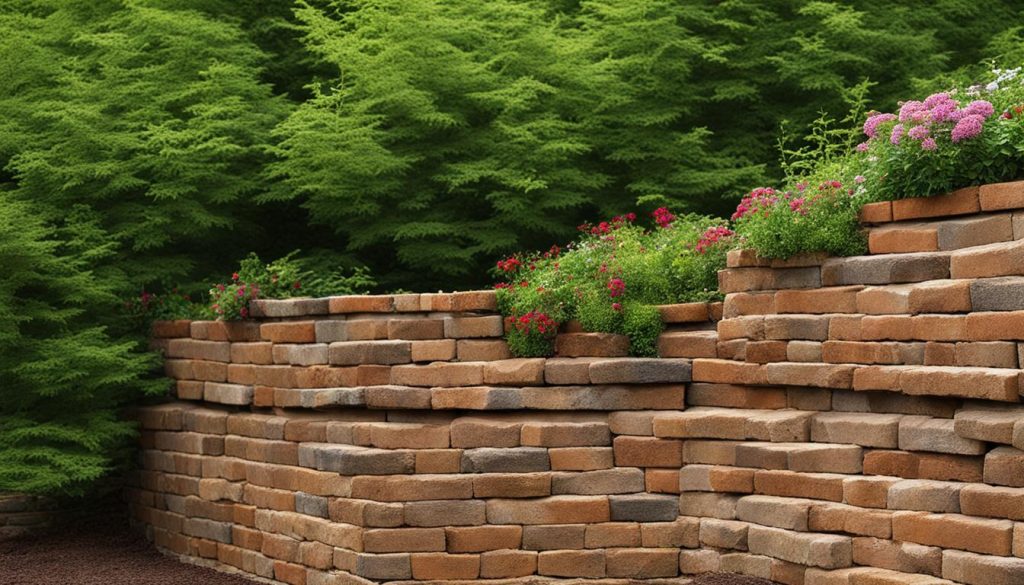
At Retaining Wall Repair, we have years of experience in constructing and repairing brick retaining walls. Our team of professionals is dedicated to providing high-quality workmanship and excellent customer service. Contact us today for more information and to schedule a consultation. Explore our projects with Retaining Wall Repair.
Gabion: A Unique and Sustainable Retaining Wall Solution
At Retaining Wall Repair, we believe in offering our clients a range of durable and attractive options for their outdoor space. One of our favorite materials to work with is gabion, a unique and sustainable solution for retaining walls.
Gabion walls are made up of wire mesh baskets filled with stones or other materials. They have become increasingly popular due to their cost-effectiveness, durability, and environmental friendliness. Unlike other materials, gabions do not require extensive excavation or the use of heavy machinery. Instead, they can be filled with locally sourced stones or recycled materials, making them a sustainable choice for those who care about the environment.
The Benefits of Gabion Retaining Walls
Gabion retaining walls offer numerous advantages, including:
- Excellent drainage: Gabions allow water to permeate through the wall, reducing hydrostatic pressure that can cause damage to traditional walls.
- Strength and durability: Gabion walls can withstand significant pressure from soil and water and have been known to last for decades.
- Visually striking: The unique texture and color of the stones used to fill gabion baskets can create a visually striking addition to any outdoor space.
- Flexible: Gabion baskets can be easily manipulated to fit various terrains and slopes, offering greater flexibility in design.
Overall, gabion retaining walls offer an eco-friendly, cost-effective, and visually appealing solution for those looking to enhance the beauty and functionality of their outdoor space.
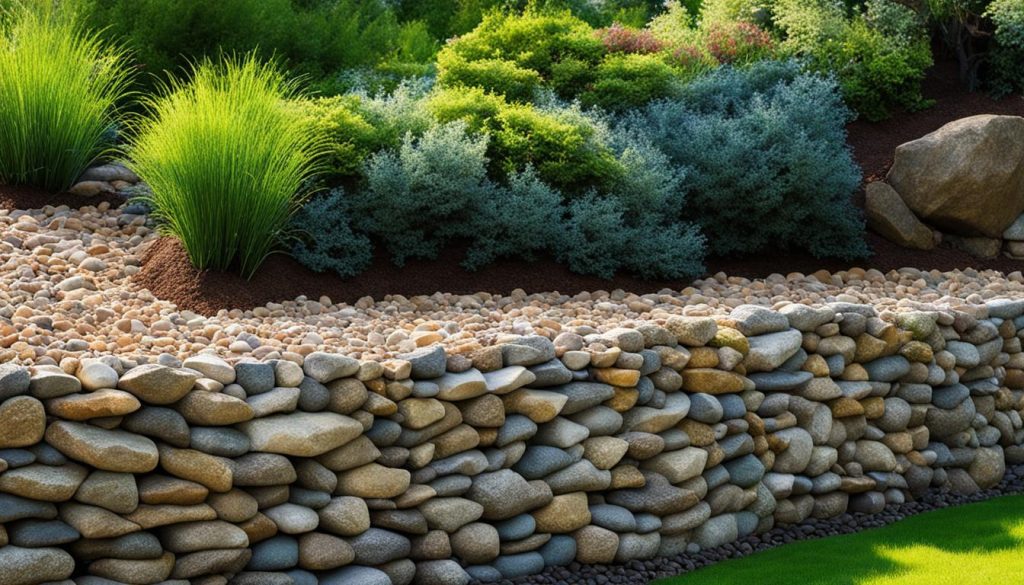
Considerations When Choosing Gabion Retaining Walls
While gabion walls are an excellent choice for many outdoor spaces, certain considerations should be taken into account when choosing this material. Among these are:
- Cost: While gabions are often less expensive than traditional walls, the cost can still vary depending on the size of the project and the type of materials used.
- Location: Gabions may not be suitable for all locations, particularly those in areas with significant erosion or heavy rainfall.
- Permitting: Depending on your location and the size of the project, you may require permits or approvals from local authorities before installing your gabion wall.
Contact Us for Your Gabion Retaining Wall Needs
If you’re considering a gabion retaining wall for your outdoor space, our team of experts at Retaining Wall Repair is here to help. With years of experience designing and installing gabion walls, we can guide you through the process from start to finish. Contact us today at (647) 812-9837 to discuss your project needs or visit our website at https://www.retainingwallrepair.ca/ for more information.
Cost Considerations for Retaining Wall Materials
When it comes to selecting the right material for your retaining wall, cost is a vital consideration. The cost of materials can vary significantly, so it’s important to factor in your budget before making a decision. Here’s a breakdown of the approximate costs associated with different retaining wall materials:
| Material | Price per Square Foot |
|---|---|
| Concrete | $20-$25 |
| Natural Stone | $25-$40 |
| Timber | $15-$25 |
| Brick | $20-$30 |
| Gabion | $15-$30 |
It’s worth noting that the above prices are estimates and can vary depending on your location, the size of your project, and the specific type of material you choose. Additionally, you may need to factor in extra costs for installation and maintenance.
When considering cost, it’s important to balance it with the durability and longevity of the material. While some materials may be more expensive upfront, they may last longer and require less maintenance in the long run, ultimately saving you money over time.
Another cost-saving tip is to use recycled materials or repurpose existing materials for your retaining wall. For example, using recycled concrete or salvaged wood can be a sustainable and affordable option.
Ultimately, the cost of your retaining wall material will depend on your unique project requirements and budget. Consider all factors carefully to make an informed decision that meets your needs and aligns with your budget.
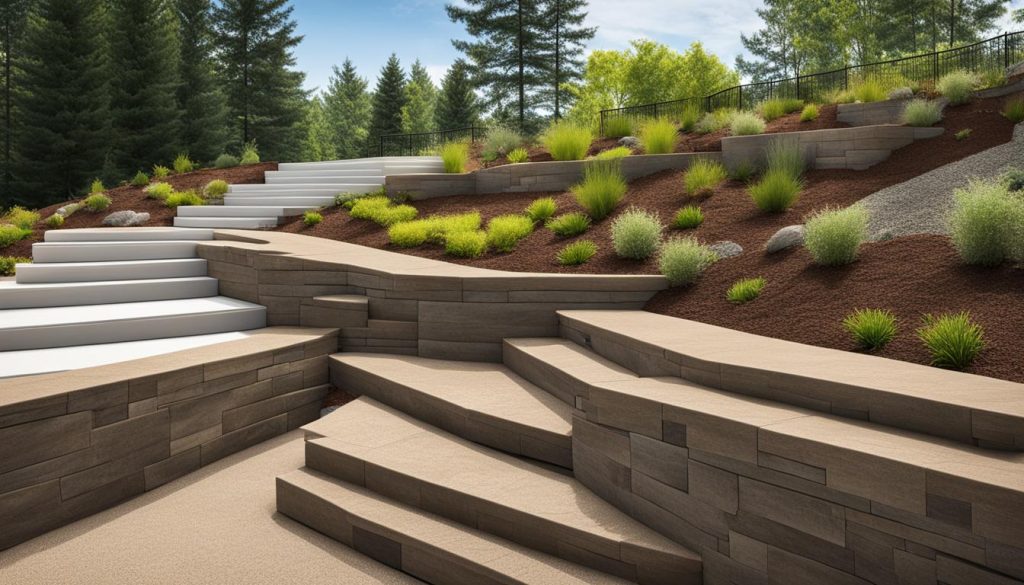
Hiring Professionals for Retaining Wall Installation
When it comes to installing a retaining wall, it can be tempting to take on the project yourself. However, it’s important to remember that retaining wall installation can be a complex and challenging task that requires specific knowledge and expertise.
At Retaining Wall Repair, we believe that hiring professionals for your retaining wall installation is the best way to ensure that the job is done correctly and efficiently. Our team of experts has years of experience in installing retaining walls, and we understand the importance of proper construction techniques and materials. By entrusting your project to us, you can relax and enjoy peace of mind knowing that your retaining wall is in capable hands.
Advantages of Hiring Professionals for Retaining Wall Installation
- Experience and expertise in handling various retaining wall projects
- Knowledge of the best materials and techniques for your project
- Access to specialized equipment and tools for efficient and accurate installation
- Effective planning and execution of the project, ensuring timely completion
- Insurance coverage, protecting you from potential damages or injuries
- Warranty and guarantee on workmanship, giving you long-lasting results and peace of mind
By hiring professionals like us, you can avoid the potential risks and challenges of DIY installation, such as improper drainage, poor soil compaction, and wall failure. With our expertise, we can ensure that your retaining wall project is completed with the highest standards in mind, and we will work with you every step of the way to achieve your desired outcome.
How to Choose a Reliable Contractor for Your Retaining Wall Installation
When selecting a contractor for your retaining wall project, it’s crucial to consider several factors to ensure that you’re hiring a reputable and reliable professional. Here are some tips to guide your decision-making process:
- Check for proper licensing and insurance coverage
- Research the company’s reputation and customer reviews
- Request a written estimate of the project
- Ask for references and photos of completed projects
- Inquire about the company’s installation process and materials used
- Communicate your specific project requirements and expectations clearly
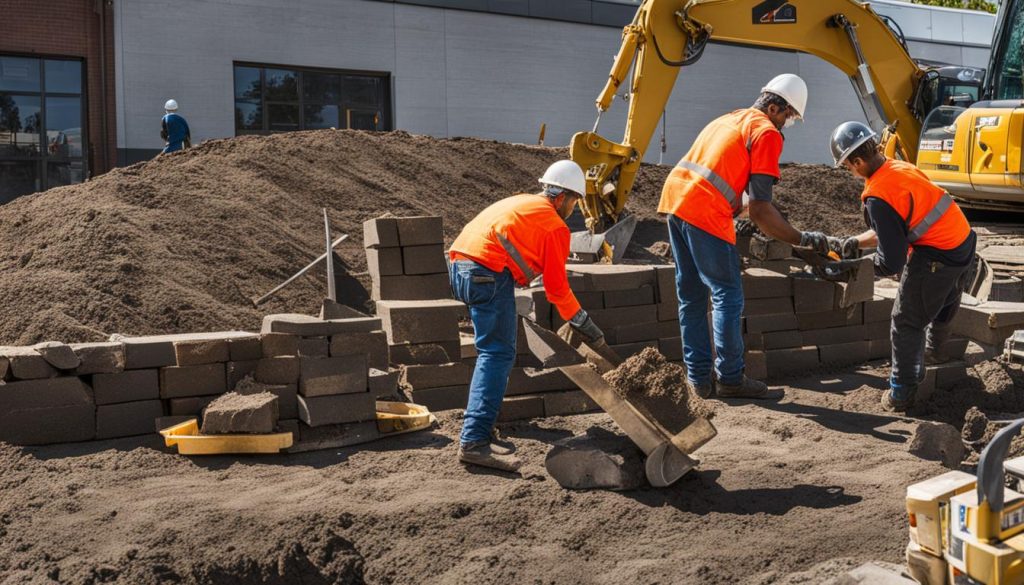
At Retaining Wall Repair, we’re committed to delivering high-quality retaining wall installation services that meet your specific needs and preferences. Contact us today at (647) 812-9837, and we’ll be happy to assist you with your project and provide you with a free estimate.
Contact Us for Retaining Wall Repair and Assistance!
At Retaining Wall Repair, we understand the importance of timely and effective repairs for your retaining walls. Whether you require minor repairs or extensive restoration, we’re here to help with all your retaining wall repair needs.
Our Services
We offer a wide range of services, including retaining wall crack repair, replacement of damaged stones or bricks, and erosion control. Our experienced team of professionals provides high-quality repair services that will restore the functionality and visual appeal of your retaining walls.
Contact Us Today!
If you need help with retaining wall repair, or have any questions about our services, please give us a call at (647) 812-9837 or visit our website at https://www.retainingwallrepair.ca/. Our friendly and knowledgeable team will be happy to assist you with all your needs.
Don’t let damaged retaining walls compromise the safety and beauty of your outdoor space. Contact Retaining Wall Repair today and let us help you restore your retaining walls to their former glory!
FAQ
How do I choose the right material for my retaining wall?
Choosing the right material for your retaining wall involves considering factors such as durability, aesthetics, budget, location, soil type, and desired wall height. Our expert advice can guide you through this process and help you make an informed decision.
What factors should I consider before choosing a retaining wall material?
Before selecting a specific material, it’s important to consider factors like budget, location, soil type, and desired wall height. These considerations can impact the effectiveness and longevity of your retaining wall.
Why is concrete a popular choice for retaining walls?
Concrete is a popular choice for retaining walls because of its durability and versatility. It provides excellent strength and can withstand pressure from soil and water. Our section on concrete walls will provide more insights into installation and maintenance.
What are the benefits of using natural stone for retaining walls?
Natural stone retaining walls offer a timeless and elegant look while providing exceptional strength. Different types of natural stones, such as granite, limestone, or sandstone, can be used to create visually stunning walls. We’ll discuss the benefits and tips to select the right stone for your project.
Why should I consider timber for my retaining wall?
Timber retaining walls are a classic choice that offer natural beauty and versatility. Wood provides a warm and inviting aesthetic that complements various outdoor settings. We’ll discuss the advantages of timber walls and important considerations for choosing the right timber material.
What are the benefits of using brick for retaining walls?
Bricks have a timeless appeal and can add traditional charm to any landscape. They offer excellent durability and can withstand the elements. Our section on brick walls will explore the benefits, installation techniques, and design options.
What are gabion walls and why are they unique?
Gabion walls are a unique and sustainable option for retaining walls. They consist of wire mesh baskets filled with stones or other materials. Gabions offer excellent drainage, strength, and can be visually striking. We’ll discuss the benefits and considerations of using gabions as a retaining wall material.
How much do retaining wall materials cost?
The cost of retaining wall materials can vary depending on the material and the size of your project. In our cost considerations section, we’ll provide a breakdown of approximate costs and cost-saving tips to help you stay within your budget.
Should I hire professionals for retaining wall installation?
While some retaining wall projects can be DIY-friendly, many require professional expertise to ensure proper construction and long-lasting results. We’ll discuss the advantages of hiring professionals and provide tips on how to choose a reliable contractor for your project.
How can I contact Retaining Wall Repair for assistance?
If you need retaining wall repair or further assistance with choosing the right material, you can reach us at (647) 812-9837. You can also visit our website at https://www.retainingwallrepair.ca/ to explore more about our services.

